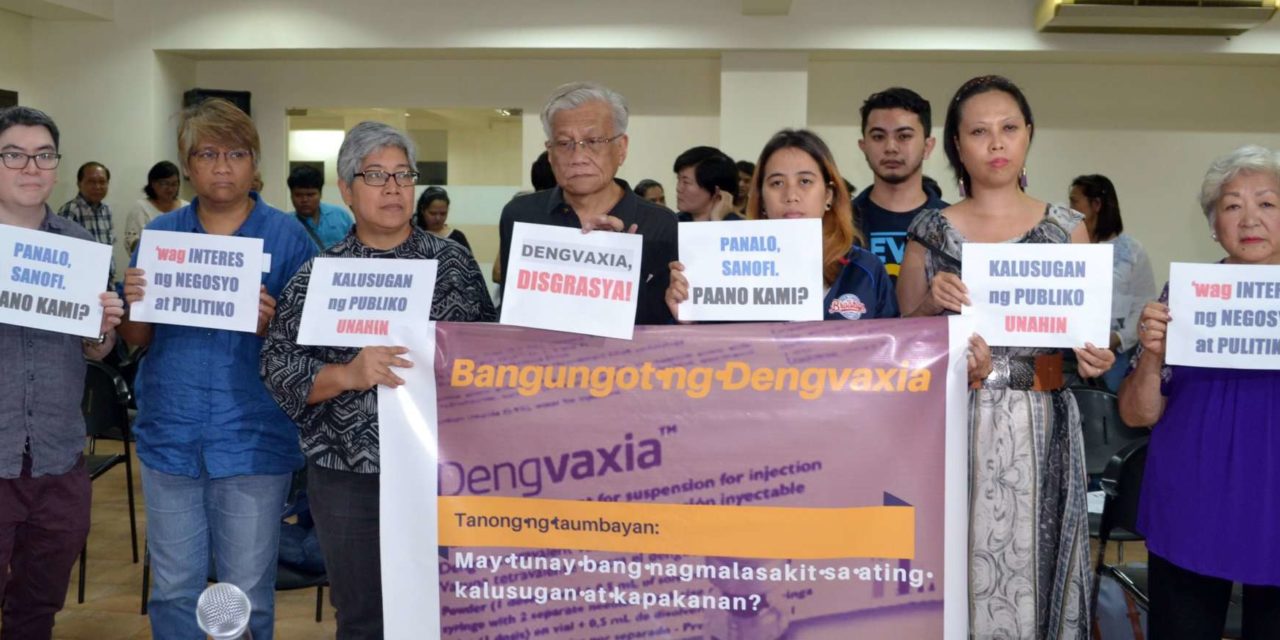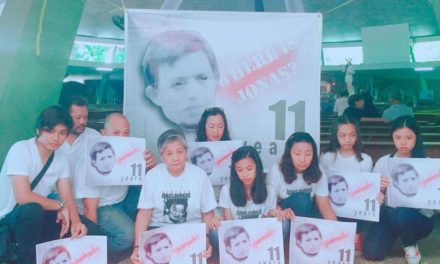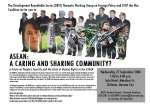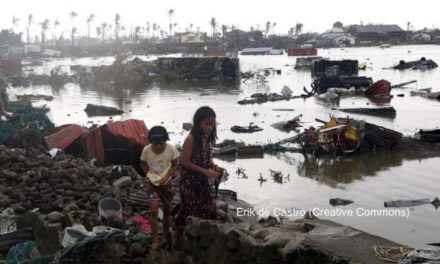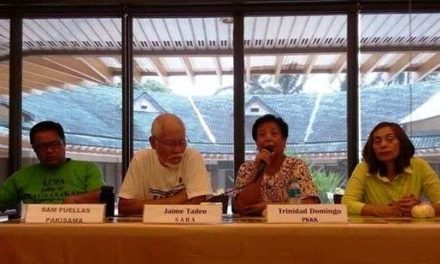Ana Maria Nemenzo of WomanHealth, one of the main organizers of the forum, framed the discussion as an assertion of peoples’ right to health: “So many have referred to this as the Dengvaxia nightmare. In the weeks following Sanofi’s announcement that the vaccine given to over 800,000 schoolchildren may have increased the risk of severe dengue in children who have not had dengue before, there have been a lot of public reaction, public hearings in both houses of Congress were initiated to investigate this public health scandal, and there have been serious debates between and among health professionals, medical experts, and the officials from the Department of Health. Lost is the peoples’ voice and the peoples’ perspective regarding peoples’ health.”
With more than 800,000[1] children administered with the Dengvaxia vaccine, panelists underscored the need to exact accountability from both drug-manufacturer Pharmaceutical giant Sanofi-Pasteur as well as from health officials behind the mass immunization program. But as Nemenzo pointed out, “more than pointing to guilt and culpability, the aim was to clarify what people can do to ensure that this kind of public health problem never happens again and how ordinary people can contribute to this effort.”
Warning signs
[Note: Hyperlinked names of speakers will open a pdf copy of their presentations]
Several speakers pointed to warning signs that were ignored throughout the process. Mercy Fabros of WomanHealth* and a member as well of the health cluster of the Alternative Budget Initiative (ABI) of Social Watch recalled that “the 3.5 Billion peso-worth Dengvaxia program was never discussed in any of these discussions in 2015, during budget preparation and legislation phases for the 2016 budget.”
Fabros also pointed out that a number of civil society groups as well as doctors and public health advocates already issued a strong warning against the mass immunization using Dengvaxia a few weeks prior to the launch of the program where they had questioned the rush to roll out the Dengue immunization program despite studies showing increased risk of severe dengue for children below nine years of age.
Health activist Maria Fatima Villena* pointed to Sanofi’s request to change the label or in the prescribing information as another warning sign that something was wrong. She highlighted segments of the press release of Sanofi dated 29 November 2017 where the drug company itself, citing its own research, had reported that “ for those not previously infected by the dengue virus however, the analysis found that in the long term, more cases of severe disease could occur following vaccination upon a subsequent dengue infection.”
In July 2016, the World Health Organization (WHO) have cautioned that “the vaccine may be ineffective or may theoretically even increase the future risk of hospitalized or severe dengue in those who are seronegative at the time the first vaccine is administered, regardless of age[2].”
Former Department of Health Secretary Jannette Garin launched the dengue mass immunization campaign of the Aquino administration a few months before the WHO report was released, issuing a PhP 3 Billion disbursement voucher to the Philippine Children’s Medical Center to fund the purchase of the vaccines.
In the timeline presented by Fabros, she also underscored that when Paulyn Ubial took over the DOH under the new Duterte administration, the new secretary was appraised of the issues surrounding the dengue program, including about the report of the WHO’s Strategic Advisory Group of Experts (SAGE). Secretary Ubial convened in July 2017 a panel of Dengue experts that assessed the program’s conformity to the SAGE report.
Rather than suspend the implementation of the program, however, its coverage was expanded to include Region VII. This was done upon the strong insistence of members of the House of Representatives. There were even threats to defer the approval of the DOH until the inclusion of Region VII in the immunization program had been made.
The Blue Ribbon Committee of the Senate began its investigation on the Dengvaxia issue as early as December 2016, following the deaths of two children vaccinated under the program. The emphasis, however, of the initial probe was whether or not there was anomaly in the 3.5 billion-peso procurement of the Dengvaxia vaccines. Since then, several investigations emerged questioning the safety and efficacy of Dengvaxia and why it was released despite pending completion of clinical test results.
Patients’ welfare
“The foremost concern about the Dengvaxia issue should be the safety of children” said Amihan Abueva of Child Rights Coalition Asia. In her presentation, Abueva highlighted the criteria instituted by the UN Convention on the Rights of the Child on public investments for children; on effectiveness, efficiency, and transparency, which the government failed to uphold when it implemented the Dengvaxia Program. Abueva stressed that the immunization program was “implemented without due diligence, without concern to the highest attainable standard of health; without effective systems for monitoring, without sufficient information to gather informed consent, and exposed dangers to the health of children.” These issues, according to Abueva, were made worse with the hastened use of public funds.
Rachel Abian, a single mother whose child was administered with the Dengvaxia vaccine in June 2016, also made an impassion plea. Abian told of how her child experienced headaches, nose bleeding, stomach pain around November 2017, but that she at first dismissed these not realizing that her child had been immunized. “Nalaman ko lang out of nowhere na nabakunahan ang anak ko. Parang lahat ng nararamdaman nya ay connected sa Dengvaxia. Natakot ako na mamatay ang mga anak na nabakunahan.” (I realized later on that my child was one of those immunized. All of a sudden, I started to connect the health problems he had been experiencing for months to Dengvaxia. That’s when I feared for the life of all those children who were vaccinated narrated) She said that she saw the consent form that she had signed in 2016 but that the form neither contained any information about the vaccine nor the risks associated with it.
Apart from the anxiety caused by the uncertainty about her child’s condition, Mrs. Abian also talked about the difficulties faced by parents who have no idea who they can turn to allay their fears. “San ako pupunta? Pumunta sa health center, pumila at tinanong kung ano ang problema, sabi ko regarding sa dengvaxia, inasssist naman at nilipat sa isang department. Emotionally stressed kaming mag-ina, gusto po sana namin ay proper assistance, magtanong sa tamang tao.” (Where will I go? We went to the health center in the barangay to ask for assistance. We told them that our concern is regarding Dengvaxia. They did assist us and asked us to go to another department. My child and I were both emotionally stressed. All we wanted was proper assistance, to get answers from the right person).
Abian lamented the lack of information and readiness, particularly with local health offices, in responding to the adverse impacts of Dengvaxia. “I learned about Dengvaxia from the News and Facebook… there was no advisory from the Municipal Health Officer,” she said. “I just need the right assistance to ensure that our children will live the rest of their lives healthy.”
Toxic mix
Walden Bello* of Focus on the Global South described the Dengvaxia issue as “a big rush to the market” and the outcome of both “corruption and corporate greed.” During the forum, Bello illustrated how the findings of a landmark study conducted by the New England Journal of Medicine already uncovered the side-effects of Dengvaxia, a year before the program was launched in 2016—that “children below 9 years old who have not been infected by dengue, and were then administered with the vaccine, has a very high risk in incurring severe dengue.” Bello argued that “although the same medical experts who produced this report have been mostly working for Sanofi, its marketing department may have overrode recommendations since there was a rush to capture the market against five other competitors such as Takeda and Merck.”
Bello added, that “in the normal state of affairs, programs like the Dengvaxia which requires billions in budget may not have been easily approved by the government, unless it was politically motivated”. Political motivations for the Dengvaxia can either be of two things according to Bello: “One is legacy since the Dengvaxia project can potentially be a cornerstone for the Aquino administration’s accomplishments, and the other is corruption because this was a time when the same administration was scrambling for money to fund their electoral campaigns.” He also said that it was impossible for President Aquino, former Health Secretary Janette Garin, and former Budget Secretary Florencio Abad to be unaware of the looming concerns on Dengvaxia, and given the magnitude of the program in terms of scope and budget “they should have put on the brakes in it, but they didn’t.”
Dr. Paterno* raised a fundamental question of whether poor Filipinos have actually benefitted from so-called health care reforms. “A review of these reforms over the past 25 years showed that the poor have not benefited from these reforms and that it is mainly higher income groups who are able to access health care services” said Paterno.
Dr. Paterno stressed that in “a context where Universal Healthcare remains inaccessible to the poor, corporations such as Sanofi should be kept in check”. He called on the audience to support the idea of “health in the hands of the people” asserting that universal primary health care can be an important pathway to social inclusion and improved health. He ended with a proposal for a people’s oversight on health outlining the following steps moving forward, learning from the Dengvaxia experience: First, to broaden the peoples coalition from the Dengvaxia issue to broader oversight on health and healthcare; Second, scale up demands, from free health care for Dengvaxia immunized children to free health care for “Dengvaxia” families, to eventually free health care for all Filipinos based on citizenship and not enrollment in PhilHealth.
As a way of summing the presentations in the forum, Mary Ann Manahan* of Focus on the Global South underscored the intersections between corporate greed and patronage politics, how government institutions and public funds have been manipulated for political and personal gains, and how programs that aim to improve the living conditions of the public have been exploited by private companies for profit.
Manahan also emphasized that controversies, like Dengvaxia, have also incurred various social costs; particularly for women and children who have faced potentially life-threatening consequences, and have to bear multiple (physical, financial, emotional) burdens.
She stressed the need to critically and continuously engage the government, and prevent potentially controversial programs such as the Dengvaxia from materializing—if possible, in its earliest stages of planning, and that there is need to raise awareness on greater implications of Dengvaxia for public health, by exacting accountability through strategic campaigns, and through long-term campaigns for reforming the country’s healthcare framework.
[1] 800,000 children at risk after Dengvaxia vaccination. http://www.manilastandard.net/news/top-stories/256034/-800-000-kids-at-risk-after-dengvaxia-vaccination-.html
[2] Publication of WHO’s first dengue vaccine position paper. http://www.who.int/immunization/newsroom/press/dengue_first_position_paper/en/

